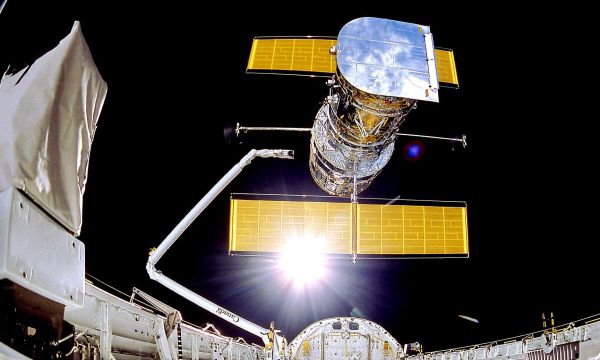NASA revives ailing Hubble Space Telescope with switch to backup computer
Hubble is back!

The Hubble Space Telescope has powered on once again! NASA was able to successfully switch to a backup computer on the observatory on Friday (July 16) following weeks of computer problems.
On June 13, Hubble shut down after a payload computer from the 1980s that handles the telescope's science instruments suffered a glitch. Now, over a month since Hubble ran into issues, which the Hubble team thinks were caused by the spacecraft's Power Control Unit (PCU), NASA switched to backup hardware and was able to switch the scope back on.
With Hubble back online with this backup hardware, the Hubble team is keeping a close watch to make sure that everything works correctly, according to a statement from NASA.
Read more: Hubble trouble is latest glitch in space telescope's long and storied history
Related: The Hubble Space Telescope and 30 years that transformed our view of the universe
"So far so good - just so proud of the @NASAHubble team as I received the updates all day. Assuming continued progress, Hubble will be in science mode later this weekend! Looking forward to that first “after” picture," Thomas Zurbuchen, the associate administrator for the science mission directorate at NASA tweeted following the news that Hubble was on the road to recovery.
So far so good - just so proud of the @NASAHubble team as I received the updates all day. Assuming continued progress, Hubble will be in science mode later this weekend! Looking forward to that first “after” picture.. 🛰🌌 https://t.co/waRN7gX28cJuly 16, 2021
Included in this switch to backup hardware, the team brought the backup PCU online as well as the backup Command Unit/Science Data Formatter (CU/SDF), which is on the other side of the Science Instrument and Command & Data Handling (SI C&DH) unit, according to the statement. The PCU diverts power to the SI C&DH while the CU/SDF formats and then sends data and commands throughout the scope.
Other pieces of hardware were also swapped to their backup versions to allow the telescope to function.
Sign up for the Live Science daily newsletter now
Get the world’s most fascinating discoveries delivered straight to your inbox.
After carefully switching to the alternative hardware on Hubble, the team turned on the scope's backup payload computer, loaded it with flight software and returned Hubble to "normal operations mode," according to the statement.
In addition to monitoring the scope and its "new" hardware following this change-up, the Hubble team has also begun recovering Hubble's science instruments from the "safe mode" configuration that they entered following the June 13 glitch.
Getting all of the science instruments back online will take more than a day, according to the NASA statement, because the team has to ensure that the instruments are at a stable temperature and are able to run safely. After the telescope's science instruments are out of safe mode, the Hubble team will calibrate them and then return to science work, according to the statement.
This is not the first time that Hubble has had technical issues in space, but the telescope, which launched aboard the space shuttle Discovery in 1990, has not been serviced by astronauts since 2009, with the shuttle program ending just two years later. Despite some technical bumps in the road, like a flaw with its primary mirror that was fixed in 1993, Hubble has consistently captured some of the most breathtaking views of the cosmos ever seen.
Email Chelsea Gohd at cgohd@space.com or follow her on Twitter @chelsea_gohd. Follow us on Twitter @Spacedotcom and on Facebook.
Chelsea Gohd joined Space.com as an intern in the summer of 2018 and returned as a Staff Writer in 2019. After receiving a B.S. in Public Health, she worked as a science communicator at the American Museum of Natural History. Chelsea has written for publications including Scientific American, Discover Magazine Blog, Astronomy Magazine, Live Science, All That is Interesting, AMNH Microbe Mondays blog, The Daily Targum and Roaring Earth. When not writing, reading or following the latest space and science discoveries, Chelsea is writing music, singing, playing guitar and performing with her band Foxanne (@foxannemusic). You can follow her on Twitter @chelsea_gohd.










